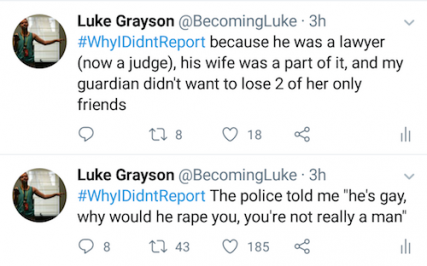By Luke Grayson
“The courage of survivors will always outweigh the hate” -Alyssa Milano
This weekend tens of thousands of people participated in the #WhyIDidntReport Twitter storm that very quickly reached the top of the trending list and stayed there for hours.
I was one of these people who tried to report it, even though I was too scared because survivors often aren’t believed, and then was shut down by the authorities and others adults I tried to tell.
 One of my posts reached more than 200 interactions in under an hour, showing me that people do believe me and that everything that happened surrounding that trauma wasn’t my fault, and should not have happened.
One of my posts reached more than 200 interactions in under an hour, showing me that people do believe me and that everything that happened surrounding that trauma wasn’t my fault, and should not have happened.We as a society so often put the futures and reputations of accused perpetrators above those they victimized. Even with the rape shield law, survivors are far too often dragged through the mud as the scapegoats of these offenders. When perpetrators are in higher profile cases, the media questions the validity of the assault and the report, and ask what the victim was wearing, how much they had to drink, if they said no, if they fought back — all to try and discredit them.
The following statistics are from the Human Rights Commission:
- 1 in 3 women will be sexually assaulted at some point in their life
- 1 in 7 men will be sexually assaulted at some point in their life
- 1 in 5 girls and 1 in 12.5 boys will be sexually abused or assaulted before turning 18, with foster kids being 10 times more likely to be assaulted (Huffington Post 01/27/2017).
- Between 40 and 44 percent of Gay and Lesbian people have experienced sexual violence
- Between 47 and 61 percent of bisexual people have experienced sexual violence
- 47 percent of known trans people have been sexually assaulted at least once in their life.
I remember sitting in class wondering who else in my class had experienced what I had; wondering if it was normal, if anyone else knew about my home life.
Over the last few years the hashtags #BelieveSurvivors, #MeToo, #WeBelieveYou, and now #WhyIDidn’tReport, have fought to make people notice what is going on. They have challenged us as a society to do better, believe survivors when they come forward, make it easier to come forward, and actually prosecute the accused regardless of whether the media or perpetrator tries to excuse it or say “she was asking for it.”
No one asks for this.
No one wants to be shamed, humiliated, or not believed for something that was out of their control. As a society we just re-victimize survivors over and over.
We must believe survivors
We must do better
We must believe survivors
We must hold those accountable for their actions
We must treat survivors better.
If everyone who reads and appreciates FāVS, helps fund it, we can provide more content like this. For as little as $5, you can support FāVS – and it only takes a minute. Thank you.
[give_form id=”53376″ show_title=”true”]









Thanks in large part to the courageous example of people like you, I truly believe we will. Until then, the solidarity of community remains our sole great refuge.